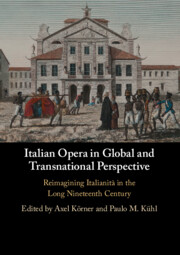 Italian Opera in Global and Transnational Perspective
Italian Opera in Global and Transnational Perspective Book contents
- Italian Opera in Global and Transnational Perspective
- Italian Opera in Global and Transnational Perspective
- Copyright page
- Contents
- Figures
- Tables
- Examples
- Notes on Contributors
- Preface and Acknowledgements
- 1 Opera and Italianità in Transnational and Global Perspective
- 2 Giving Singers a Voice
- 3 Nina d’Aubigny’s ‘Italian Voice’
- 4 Italian Opera and Creole Identities
- 5 Italian Opera in Vormärz Vienna
- 6 Southern Exchanges
- 7 ‘For a Moment, I Felt Like I Was Back in Italy’
- 8 Reimagining Rossini
- 9 From Heaven and Hell to the Grail Hall via Sant’Andrea della Valle
- 10 Arcadia Undone
- 11 Italian Impresarios, American Minstrels and Parsi Theatre
- 12 German National Identity and Operatic Italianità
- 13 (Opera) Fever in Belle Époque Manaus
- 14 Between ‘Sung Theatre’ and Asakusa Opera
- 15 Epilogue
- Index
2 - Giving Singers a Voice
The Italian Opera Company and the Press in Rio de Janeiro, 1820–1831
Published online by Cambridge University Press: 17 March 2022
- Italian Opera in Global and Transnational Perspective
- Italian Opera in Global and Transnational Perspective
- Copyright page
- Contents
- Figures
- Tables
- Examples
- Notes on Contributors
- Preface and Acknowledgements
- 1 Opera and Italianità in Transnational and Global Perspective
- 2 Giving Singers a Voice
- 3 Nina d’Aubigny’s ‘Italian Voice’
- 4 Italian Opera and Creole Identities
- 5 Italian Opera in Vormärz Vienna
- 6 Southern Exchanges
- 7 ‘For a Moment, I Felt Like I Was Back in Italy’
- 8 Reimagining Rossini
- 9 From Heaven and Hell to the Grail Hall via Sant’Andrea della Valle
- 10 Arcadia Undone
- 11 Italian Impresarios, American Minstrels and Parsi Theatre
- 12 German National Identity and Operatic Italianità
- 13 (Opera) Fever in Belle Époque Manaus
- 14 Between ‘Sung Theatre’ and Asakusa Opera
- 15 Epilogue
- Index
Summary
In the 1820s, a stable company of Italian singers was in charge of the operatic performances staged at the Imperial Theatre in Rio de Janeiro. Working together with a French ballet troupe, those soloists joined forces to present their repertoire before a heterogeneous audience. Works by Rossini and his contemporaries were sung in the original language, subscriptions were sold for annual seasons and Italian masterpieces crowned the theatrical festivities offered to the Emperor. The chapter examines this recently independent country’s attraction for foreign singers and looks at how these artists were able to pursue their careers in a totally different milieu to that to which they had been accustomed, living in a city that offered great opportunities, but also considerable challenges to newcomers. A small group of Italian singers were employed by a local impresario, with the aim of making opera a viable cultural activity at an Imperial Court that was proud of its connections with Europe, yet they also struggled with economic difficulties and the country’s political instability. The press assumed a central role in negotiating the relationship between artists and their audiences, revealing a growing public interest in opera, its backstage and the lives of its protagonists.
Keywords
- Type
- Chapter
- Information
- Italian Opera in Global and Transnational PerspectiveReimagining Italianità in the Long Nineteenth Century, pp. 41 - 58Publisher: Cambridge University PressPrint publication year: 2022
- 1
- Cited by
